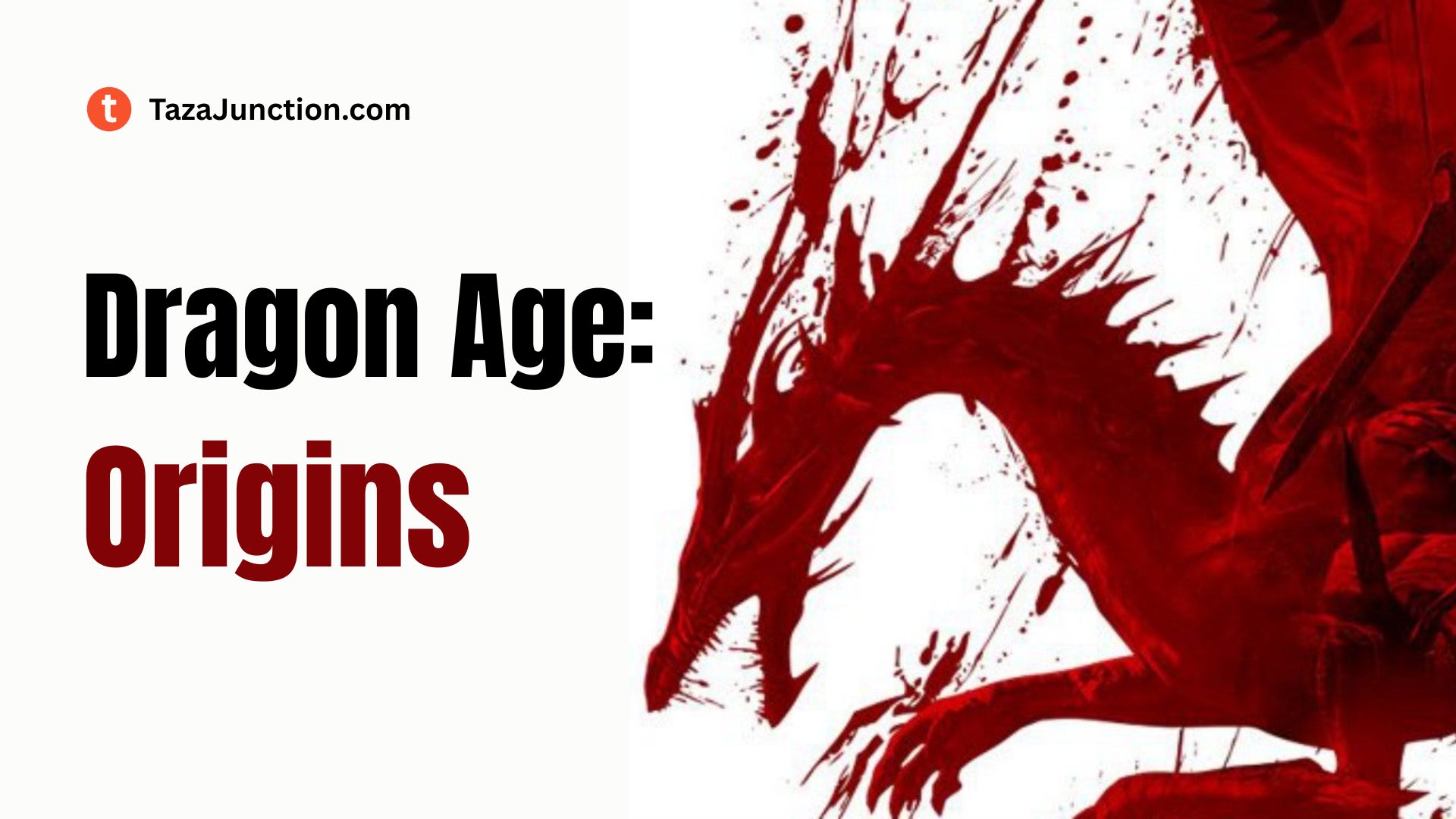For over a decade, fans of BioWare’s iconic RPG have passionately revisited its rich world, intricate choices, and memorable characters. Dragon Age: Origins, released in 2009, remains one of the most beloved Western role-playing games of all time.
But what many fans didn’t know—until now—is that the game was nearly brought back to life in modern form. A recent revelation from a former BioWare executive producer has confirmed that a Dragon Age: Origins remaster was seriously considered, and at one point, almost happened.
Let’s dive with TazaJunction.com into what was revealed, why it never came to light, and what this means for the future of the Dragon Age franchise.
Table of Contents
A Hidden Chapter in BioWare’s History
The news came from Mark Darrah, a longtime veteran of BioWare who played a key role in the development of the Dragon Age series. During a recent discussion with fans and media, Darrah disclosed that a Dragon Age: Origins remaster was on the table at one point, and had even reached early planning stages.
According to Darrah, the project wasn’t just wishful thinking—it had genuine momentum. Conversations were being held internally, and a development roadmap was loosely outlined.
The idea was to revisit Origins with modern visuals, improved UI, and quality-of-life enhancements, while staying true to the core design that fans loved. However, as is often the case in game development, the remaster was shelved before it could take off.
Why Dragon Age: Origins Still Matters?
To understand the buzz surrounding this potential Dragon Age: Origins remaster, it’s important to remember what made the game so impactful in the first place.
Released at a time when RPGs were transitioning into more action-focused experiences, Origins stayed true to its roots: party-based combat, strategic planning, and meaningful player choices.
It allowed players to pick from multiple origin stories, each affecting the way the world reacted to them. The mature storytelling, moral complexity, and sprawling lore helped establish Dragon Age as one of BioWare’s flagship franchises.
While subsequent titles (Dragon Age II, Inquisition) expanded the world and gameplay mechanics, many still consider Origins the franchise’s high point. That enduring legacy is a big part of why the idea of a Dragon Age: Origins remaster resonates so strongly with fans.
What the Remaster Could Have Included?

Although Darrah didn’t provide exhaustive details about what the remaster might have looked like, he hinted at some key improvements that were discussed during its early consideration.
1. Visual Overhaul
Dragon Age: Origins was praised for its atmosphere and world-building, but even at the time of release, it wasn’t considered a visual powerhouse. A remaster would likely have upgraded textures, lighting, character models, and environments to meet today’s standards—similar to what we’ve seen with remasters like Mass Effect: Legendary Edition.
2. UI and Inventory Improvements
One of the most consistent criticisms of Origins was its clunky UI and complicated inventory system. The remaster would have refined these elements, making them more intuitive and accessible without sacrificing depth.
3. Combat Refinement
While strategic, the original combat sometimes felt stiff. A Dragon Age: Origins remaster may have brought smoother animations, streamlined skill trees, and improved AI to make party management more rewarding.
4. Quality of Life Features
Modern conveniences like auto-saving, customizable difficulty, better quest tracking, and controller support would have made Origins more enjoyable for new and returning players alike.
Why the Remaster Didn’t Happen?
The question on everyone’s mind is obvious: If there was so much potential and internal interest, why was the Dragon Age: Origins remaster canceled?
Darrah pointed to limited resources and shifting priorities as the key reasons. BioWare was (and still is) working on the next entry in the series, Dragon Age: Dreadwolf, a massive undertaking that demands full attention. With limited bandwidth and a finite development budget, choices had to be made.
From a business perspective, investing in the future of the franchise likely took precedence over revisiting its past—especially with the pressure to deliver a new mainline game after several delays and mixed reception to Anthem and Mass Effect: Andromeda.
In addition, technical challenges likely played a role. Dragon Age: Origins was built on an older engine, and bringing it up to modern standards could have required far more effort than anticipated.
What This Means for Fans?
The news that a Dragon Age: Origins remaster almost existed is bittersweet. On one hand, it validates what fans have been asking for. On the other, it confirms that the remaster is not currently in development, and may never be.
Still, Darrah’s comments leave the door slightly open. He didn’t rule out the idea entirely—just acknowledged that the timing wasn’t right. That means a remaster could still happen someday, especially if Dreadwolf performs well and rekindles interest in the franchise’s early days.
For now, fans can revisit the original through digital platforms, but they’ll have to do so without the enhancements a remaster would have provided.
The Bigger Picture: RPGs and Remasters
The potential Dragon Age: Origins remaster fits into a broader trend in the gaming industry. In recent years, remasters and remakes have become major pillars for publishers. Titles like Final Fantasy VII Remake, Resident Evil 4 Remake, and Mass Effect: Legendary Edition have shown that there’s both a market and a hunger for revisiting iconic titles.
Remasters serve two key purposes: they bring classic experiences to new audiences and allow developers to correct past limitations with modern technology. In the case of Dragon Age: Origins, both reasons would have made the project worthwhile.
The emotional connection players have with their original Grey Warden, the decisions they made, and the allies they lost along the way—these are memories worth preserving and refreshing.
Could Modding Fill the Gap?

Interestingly, the absence of a Dragon Age: Origins remaster hasn’t stopped the community from trying to modernize the game themselves. Modding communities have released high-resolution texture packs, gameplay tweaks, and UI improvements to bring Origins closer to current expectations.
While these mods don’t fully replace a professionally remastered version, they’re a testament to the passion the community still holds for the game. In fact, BioWare’s decision not to pursue a remaster might drive even more innovation within the modding scene.
Looking Ahead: Dragon Age’s Future
While fans may mourn the missed opportunity for a Dragon Age: Origins remaster, the franchise is far from dormant. Dragon Age: Dreadwolf is deep in development, and BioWare has promised a return to the franchise’s darker roots, along with new storytelling innovations.
If Dreadwolf succeeds, it could create renewed interest in the full saga—perhaps even convincing BioWare and EA to revisit Origins down the line. A remaster could serve as a bridge between the original trilogy and new chapters, introducing new players to where it all began.
Final Thoughts
The revelation that a Dragon Age: Origins remaster was once in consideration is both exciting and frustrating for fans. It confirms what many already believed—that the game deserves a fresh spotlight—and shows that even within BioWare, there was a desire to give the classic RPG a modern revival.
Though the remaster may be on pause, the legacy of Origins continues to grow. Whether you played it in 2009 or are just discovering it now, the game remains a landmark in story-driven RPG design.
And who knows? With enough fan demand and a successful future for the franchise, the remaster dream might one day become reality.

